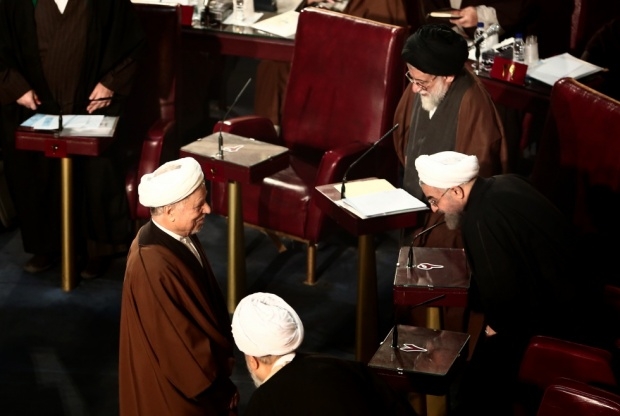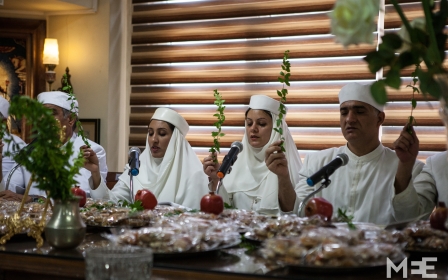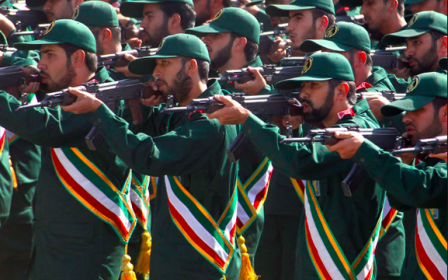Behind Iran's enduring hostility towards Israel

In a 6 July interview, Iran’s influential cleric and former president, Ayatollah Akbar Hashemi-Rafsanjani, made bold comments by saying that the “presence of the forged Israeli regime is temporary”. Rafsanjani, current head of the Expediency Discernment Council, the advising body to Iran’s leader, added, “Eventually one day this alien existence that has been urged into the body of an ancient nation and a historical region will be wiped off the map.”
Rafsanjani's statements are notable in that he is not a hardliner. Instead, he leads the moderates’ camp in the Iranian establishment.
Another influential moderate figure, Hassan Khomeini, the grandson of the founder of the Islamic Republic of Iran, went even further. At a gathering called “Palestine, symbol of resistance” on 7 July, he said, “Israel should be obliterated by resorting to jihad.”
This hostile posture toward Israel is not, as some have suggested, limited to hardliners such as Iran's previous president, Mahmoud Ahmadinejad. This aggressive stance, rather, is shared by each of the major political currents that have a share of power in the Iranian nezam (political system).
What can explain the origin and formation of this worldview now entrenched in Iran's political status quo? Four significant factors are responsible.
Religious explanation
The Quran teaches that Muslims may resort to armed struggle when they are compelled to leave their homes. An emblematic verse in the Quran, in this respect, is as follows:
Permission to take up arms is hereby given to those who are attacked because they have been oppressed – Allah indeed has power to grant them victory – those who have been unjustly driven from their homes, only because they said: ‘Our Lord is Allah’. (22:39-40)
There today exist millions of Palestinians scattered throughout the Middle East and around the globe who have been denied by Israel their right to return to their homeland. The Israeli Law of Return, however, grants every Jew, wherever he or she may live, the right to immigrate to Israel as an oleh (a Jew immigrating to Israel) and to become an Israeli citizen. Israeli citizenship is granted to Jews on the first day of their arrival in the country.
The second religious factor is the occupation of Beitol Moghadas (Jerusalem). Jerusalem is considered the holy land for each Abrahamic religion - Christianity, Judaism and Islam. But for Muslims, Beitol Moghadas and the Al-Aqsa mosque in particular carry a crucial significance. Muslims greatly value Beitol Moghadas because according to Islamic tradition, the original Qibla, or direction of prayer for Muslims, was toward the Al-Aqsa Mosque until the Prophet Mohammad was instructed in a revelation from God to change the direction to face the Kaaba in Mecca.
Historical Explanation
During the reign of the Shah of Iran, who was toppled following the successful Islamic Revolution in 1979, Israel maintained very warm and close relations with him. The Shah, in oppressing religious conservatives and denigrating Ayatollah Khomeini and his followers, used the derogatory term erteja-e siah, or black reactionaries, when referring to them.
Israeli interests in Iran became prominent as early as the 1950s, when Mossad, Israel's intelligence agency, cooperated with the CIA in establishing Iran’s brutal secret service, SAVAK. A 1979 CIA report noted: “The main purpose of the Israeli relationship with Iran was the development of a pro-Israel and anti-Arab policy on the part of the Iranian officials. Mossad has engaged in joint operations with SAVAK over the years since the late 1950s.”
The closeness and cooperation between Israel and the Shah left a deep scar on the minds of religious forces in Iran. Ayatollah Khomeini’s 3 June, 1963 speech – which many analysts identify as an event that ignited the first widespread religious and political movement that led to the Islamic revolution of Iran - sparked three days of major riots throughout Iran. The theme of the speech was, “The Shah and Israel; the root of people’s suffering in Iran.” In his fiery speech, Ayatollah Khomeini said:
"I was informed today that a number of preachers were taken to the offices of SAVAK and were told that they could speak about anything they chose other than three subjects: they were not to say anything bad about the Shah; not to attack Israel; and not to say that Islam is endangered. … [Israel] wishes to seize your economy, to destroy your trade and agriculture and to appropriate your wealth. Anything which proves to be a barrier, or blocks its path, is to be removed by means of its agents. The Quran is blocking its path; it must be removed. The religious establishment is blocking its path, it too must be removed. … We are affronted by our very own government, which assists Israel in achieving its objectives by obeying her command."
Thus, by the time the Islamic Republic of Iran came into existence, seeds of hostility between the two states had already been planted.
Political explanation
One argument is that the Iranian leadership’s hostile position toward Israel seeks to attract domestic support among the religious conservatives on the one hand and the Islamic world on the other. Domestic grassroots support for this stance will secure the Iranian system, the argument goes, and the vast support within the Islamic world will grant them the stature of an Islamic and regional power. This broad support will also increase the cost of a military operation by and for the US against them. This argument, however, comes with caveats.
The hostility towards Israel is perhaps one of the most significant elements of the US-Iran conflict. Indeed, the US's coercive policies adopted in the last three decades to instigate Iranian regime change are very much a reaction to the Iranian government’s threat to Israel's security. Whether the US approach to Iran is a result of the influence of the Israel lobby or for strategic reasons, Iran's hostile stance toward Israel is a significant factor in US decision making. Therefore, a more hostile approach toward Israel invites more hostility from the US, which then results in more coercion against and less security for the Iranian nezam.
The socio-psychological factor
One of the primary objectives of Ayatollah Khomeini, the Iranian revolution’s leader, and his followers' was to revive “Islam’s dignity”. Israel, with its aggressive policies and insolent language toward Palestinians, has created extreme, negative sentiments toward the Israeli government. These high-voltage sentiments are most notable within the religious faction of Iran's society.
Worsening matters is the perception that the United States supports Israel unconditionally, regardless of Israel's dubious behaviour. The Iranian establishment perceives that the Islamic world is humiliated by Israel partly because of the US government’s unabated support for Israel. The establishment realises that US support provides Israel with the courage to continue their decades-long occupation and demolition of Palestinian homes in Jerusalem, the West Bank and the Gaza Strip, despite Palestine playing no role in the historic atrocities against Jewish people.
From 1972 to 2011, the US exercised its United Nations veto power 42 times against resolutions critical of Israel. Of those 42 vetoes, 32 were resolutions dealing specifically with the Israeli-Palestinian conflict. In each of those 32 vetoes, the US stood alone, even if the resolutions concerned unambiguous cases of humanitarian intervention.
The hostile stance of the Iranian nezam toward Israel is unlikely to dissipate any time soon. However, if the international community - the US in particular - chooses to intervene effectively and seriously to support a solution freely chosen by the majority of Palestinian people, and the Palestinian-Israeli conflict comes to an end, the hostile posture of Iran toward Israel would be mollified.
- Shahir Shahidsaless is a political analyst and freelance journalist writing primarily about Iranian domestic and foreign affairs. He is also the co-author of “Iran and the United States: An Insider’s View on the Failed Past and the Road to Peace,” published in May 2014.
The views expressed in this article belong to the author and do not necessarily reflect the editorial policy of Middle East Eye.
Photo: President Hassan Rouhani (R) greets former president and head of Expediency Council, Akbar Hashemi Rafsanjani (L) as they attend a session to appoint a new chairman on 10 March, in Tehran (AFP) hoto:
New MEE newsletter: Jerusalem Dispatch
Sign up to get the latest insights and analysis on Israel-Palestine, alongside Turkey Unpacked and other MEE newsletters
Middle East Eye delivers independent and unrivalled coverage and analysis of the Middle East, North Africa and beyond. To learn more about republishing this content and the associated fees, please fill out this form. More about MEE can be found here.





